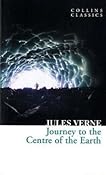
Journey to the Centre
of the Earth
by Jules Verne
“While there is life there is hope. I beg to assert…that as long as a man’s heart beats, as long as a man’s flesh quivers, I do not allow that a being gifted with thought and will can allow himself to despair.”
― Jules Verne, Journey to the Centre of the Earth
“While there is life there is hope. I beg to assert…that as long as a man’s heart beats, as long as a man’s flesh quivers, I do not allow that a being gifted with thought and will can allow himself to despair.”
― Jules Verne, Journey to the Centre of the Earth
A decade ago I read Jon Krakauer's exciting travel adventure book Into Thin Air about a disastrous attempt to scale Mt. Everest. The book read like a fictional adventure tale though it was reporting actual events. Jules Verne's classic travel adventure tale reads like a non-fiction account of an actual expedition even though it was the fictional product of Verne's imagination. Journey to the Centre of the Earth was Jules Verne's second book, the first was Five Weeks in a Balloon (and another was being published serially in a magazine).
When Prof. Lidenbrock deciphers an old parchment that describes a secret passage through a volcano to the centre of the earth, nothing will stop him and his nephew Axel from embarking on a perilous, terrifying journey through the subterranean world. Thus begins the adventure that will take them to Iceland and downward through a volcano into the center of the earth itself. Verne uses young Axel as the protagonist and in so doing creates a version of the classic heroic journey. Alex will eventually be separated from the other travelers and face challenges on his own before rejoining them for the conclusion of the journey. Each of Verne's novels are marvels of action, adventure, ideas, science and sometimes the fantastic. In this case the emphasis is primarily on the scientific, but if you suspend your disbelief and join Verne on his more fantastic journeys like From the Earth to the Moon you find enjoyable tales. This novel is not my favorite by Verne -- see Twenty Thousand Leagues Under the Sea for that, but it is as they say, a rollicking good story.
Journey to the Centre of the Earth by Jules Verne.
No comments:
Post a Comment